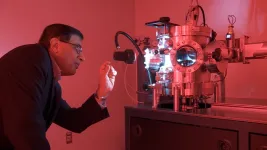(Press-News.org) University of Queensland-led research has revealed liver cells influence the body’s internal circadian clock, which was previously believed to be solely controlled by the brain.
Associate Professor Frédéric Gachon from UQ’s Institute for Molecular Bioscience and Dr Serge Luquet from Université Paris Cité/CNRS in France and their collaborators have demonstrated that mice with transplanted human liver cells had modified circadian rhythms.
Dr Gachon said the circadian internal body clock controls most biological functions including sleep, hormone secretion, body temperature and metabolism.
“Mice are nocturnal but when their liver cells were replaced with human cells, their circadian clock advanced by two hours – they ate and slept at different times to mice without those transplanted cells,” Dr Gachon said.
“The mice in our study started to eat and be active before night-time began, which is very unusual for a nocturnal animal.”
Until now, the synchronisation of the mammalian circadian rhythm was thought to be controlled exclusively by a central circadian clock composed of a group of brain cells called the suprachiasmatic nucleus.
Dr Gachon says this study shows human liver cells in a mouse can act on the central clock and modify circadian behaviour.
“Liver disease and metabolic diseases such as diabetes and obesity are associated with disrupted sleep, irregular eating and a disturbance of the circadian clock,” Dr Gachon said.
“This study suggests that the abnormal liver function is likely driving this disturbed rhythm.
“Our study deepens our understanding of the hormonal and neuronal mechanisms involved in the role of the liver in controlling circadian rhythms.
“It suggests that restoring liver physiology could benefit the health and wellbeing of patients.
“It also shows that the regulation of circadian rhythms is more complex than we suspected and presents avenues for investigating potential new treatments for metabolic diseases.”
The research was published in Science Advances.
END
Tick tock – the liver controls the circadian clock
Research has revealed liver cells influence the body’s internal circadian clock, which was previously believed to be solely controlled by the brain
2023-05-17
ELSE PRESS RELEASES FROM THIS DATE:
University of Colorado data scientists develop rare disease phenopacket standard, tools for global use
2023-05-17
Researchers in the Department of Biomedical Informatics (DBMI) at the University of Colorado School of Medicine have reached a major milestone in developing standards and tools for creating phenopackets that may foster more innovation and advancement in the medical field by allowing health professionals to more easily collect and share data.
A newly-released paper highlights the latest suite of coordinated standards and tools used to collect data related to rare diseases.
The phenopackets, ...
Press Release: ECOG-ACRIN announces the recipients of its 2023 scientific leadership and mentorship awards
2023-05-17
The ECOG-ACRIN Cancer Research Group (ECOG-ACRIN) announces the following cancer researchers as the recipients of the organization’s annual scientific leadership and mentorship awards. Through its Mentoring Program, ECOG-ACRIN formally recognizes outstanding scientific leadership through events and awards that identify, encourage, and recognize investigators in the early years of their careers. The program is expanding in 2023 with the addition of the Remarkable Mentor to Women in Oncology Award.
Young Investigator of the Year
Patrick M. Forde, MBBCh, is the 2023 recipient of the Young Investigator Award, a professional honor to recognize ...
UAB will lead an $8 million Department of Energy grant from the National Nuclear Security Administration, or NNSA
2023-05-17
BIRMINGHAM, Ala. – Yogesh Vohra, Ph.D., is the principal investigator of a five-year, $8 million grant from the United States Department of Energy’s National Nuclear Security Administration Stewardship Science Academic Alliances program that supports fundamental research in materials under extreme conditions and in advanced manufacturing.
Vohra, a professor university scholar in the University of Alabama at Birmingham Department of Physics and associate dean in the UAB College of Arts and Sciences, says the grant will leverage the expertise of nine faculty members across five disciplines at UAB and the University of Massachusetts-Amherst, ...
High-res Western drought forecasts could be on horizon
2023-05-17
Contacts:
David Hosansky, NCAR/UCAR Manager of Media Relations
hosansky@ucar.edu
720-470-2073
Ali Branscombe, NCAR/UCAR Communications Specialist
abran@ucar.edu
651-764-9643
A new computer modeling technique developed by scientists at the National Center for Atmospheric Research (NCAR) offers the potential to generate months-ahead summertime drought forecasts across the Western United States with the capability of differentiating between dry conditions at locations just a couple of miles apart.
The technique uses statistical methods and machine learning to analyze key drought indicators during the winter and spring and correlate them with the likelihood of dryness throughout the ...
CCNY researchers use structured light on a chip in another photonics breakthrough
2023-05-17
In everyday life we experience light in one of its simplest forms – optical rays or beams. However, light can exist in much more exotic forms. Thus, even beams can be shaped to take the form of spirals; so-called vortex beams, endowed with unusual properties. Such beams can make dust particles to spin, just like they indeed move along some intangible spirals.
Light modes with such added structure are called “structured,” and even more exotic forms of structured light can be attained in artificial optical materials – metamaterials, where ...
Higher blood sugar linked to faster loss of brain power in stroke survivors
2023-05-17
Surviving a stroke can bring many long-term effects – including a much higher risk of dementia. But a study suggests that blood sugar may play a key role in that risk.
Loss of general thinking ability happened much faster in stroke survivors who had high blood glucose in the years after their health crisis, even after accounting for other things that might affect their brainpower, according to a study published in JAMA Network Open.
Those whose blood pressures or cholesterol were high after their stroke did not lose points on tests of thinking ability, ...
Understanding how to best transform speech into tactile vibrations could benefit hearing-impaired people
2023-05-17
WASHINGTON – Researchers at Georgetown University Medical Center, in collaboration with George Washington University, leveraged their understanding of auditory speech processing in the brain to enable volunteers to perceive speech through the sense of touch. This may aid in the design of novel sensory substitution devices -- swapping sound for touch, for example -- for hearing-impaired people.
The findings appear in the Journal of Neuroscience on May 17, 2023.
“In the past few years, our understanding of how the brain processes information from different senses has expanded greatly as we are starting to understand how brain networks are connected across different ...
Henry Ford Health and Ephemeral Tattoo partner to study made-to-fade tattoo ink for medical markings
2023-05-17
DETROIT (May 17, 2023) – Researchers at Henry Ford Health — one of the nation’s leading integrated academic medical institutions — in collaboration with Ephemeral Tattoo, have conducted a study on the safety and efficacy of made-to-fade tattoos for medical markings.
Fifty to 60 percent of cancer patients receive radiation therapy during their course of treatment. Patients have traditionally been required to receive small, permanent tattoos on their skin to ensure therapy is delivered accurately to the same place each time while minimizing healthy tissue exposure to radiation. On the heels of this study, Ephemeral will offer its innovative made-to-fade ...
New UC Davis research using DNA changes origin of human species, researchers suggest
2023-05-17
In testing the genetic material of current populations in Africa and comparing against existing fossil evidence of early Homo sapiens populations there, researchers have uncovered a new model of human evolution — overturning previous beliefs that a single African population gave rise to all humans. The new research was published today, May 17, in the journal Nature.
Although it is widely understood that Homo sapiens originated in Africa, uncertainty surrounds how branches of human evolution diverged and how people migrated ...
A new understanding of human origins in Africa
2023-05-17
There is broad agreement that Homo sapiens originated in Africa. But there remain many uncertainties and competing theories about where, when, and how.
In a paper published today in Nature, an international research team led by McGill University and the University of California-Davis suggest that, based on contemporary genomic evidence from across the continent, there were humans living in different regions of Africa, migrating from one region to another and mixing with one another over a period of hundreds of thousands of years. This view runs counter to some of the dominant theories about human origins in ...
LAST 30 PRESS RELEASES:
SfN announces Early Career Policy Ambassadors Class of 2026
Spiritual practices strongly associated with reduced risk for hazardous alcohol and drug use
Novel vaccine protects against C. diff disease and recurrence
An “electrical” circadian clock balances growth between shoots and roots
Largest study of rare skin cancer in Mexican patients shows its more complex than previously thought
Colonists dredged away Sydney’s natural oyster reefs. Now science knows how best to restore them.
Joint and independent associations of gestational diabetes and depression with childhood obesity
Spirituality and harmful or hazardous alcohol and other drug use
New plastic material could solve energy storage challenge, researchers report
Mapping protein production in brain cells yields new insights for brain disease
Exposing a hidden anchor for HIV replication
Can Europe be climate-neutral by 2050? New monitor tracks the pace of the energy transition
Major heart attack study reveals ‘survival paradox’: Frail men at higher risk of death than women despite better treatment
Medicare patients get different stroke care depending on plan, analysis reveals
Polyploidy-induced senescence may drive aging, tissue repair, and cancer risk
Study shows that treating patients with lifestyle medicine may help reduce clinician burnout
Experimental and numerical framework for acoustic streaming prediction in mid-air phased arrays
Ancestral motif enables broad DNA binding by NIN, a master regulator of rhizobial symbiosis
Macrophage immune cells need constant reminders to retain memories of prior infections
Ultra-endurance running may accelerate aging and breakdown of red blood cells
Ancient mind-body practice proven to lower blood pressure in clinical trial
SwRI to create advanced Product Lifecycle Management system for the Air Force
Natural selection operates on multiple levels, comprehensive review of scientific studies shows
Developing a national research program on liquid metals for fusion
AI-powered ECG could help guide lifelong heart monitoring for patients with repaired tetralogy of fallot
Global shark bites return to average in 2025, with a smaller proportion in the United States
Millions are unaware of heart risks that don’t start in the heart
What freezing plants in blocks of ice can tell us about the future of Svalbard’s plant communities
A new vascularized tissueoid-on-a-chip model for liver regeneration and transplant rejection
Augmented reality menus may help restaurants attract more customers, improve brand perceptions
[Press-News.org] Tick tock – the liver controls the circadian clockResearch has revealed liver cells influence the body’s internal circadian clock, which was previously believed to be solely controlled by the brain



